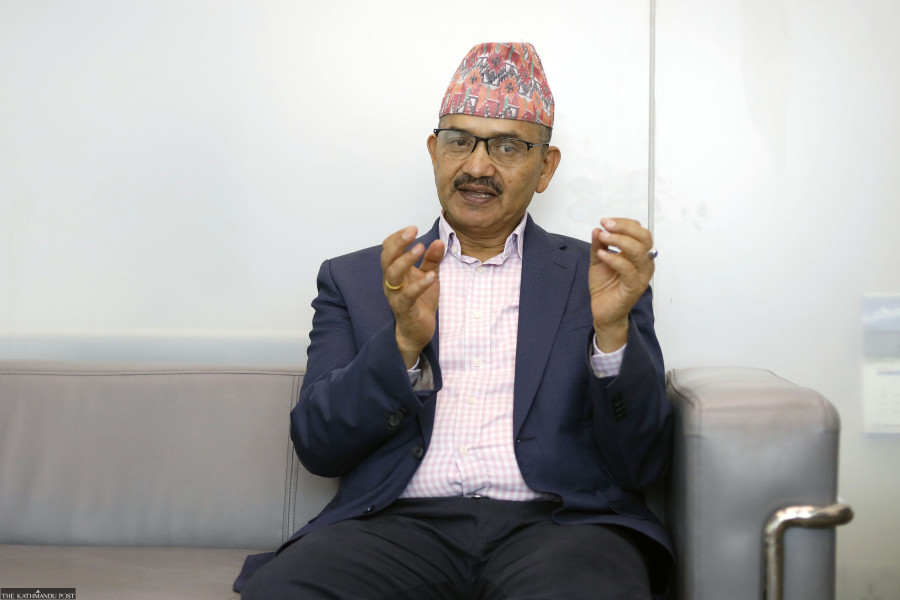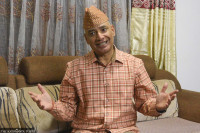Interviews
Economic reforms are the most we can expect from this coalition
Party leaders haven’t spoken against the selection of gangsters as ministers. Even the office bearers are silent now. This is dangerous.
Thira Lal Bhusal
Within days of CPN-UML chair KP Sharma Oli and Nepali Congress President Sher Bahadur Deuba reaching a deal to form a new government under Oli’s leadership, some Congress leaders including the two party general secretaries started doubting the deal’s implementation. Independent observers also have doubts over the longevity of the Congress-UML partnership. To get some insight, the Post’s Thira Lal Bhusal sat down with Congress Central Committee member Govind Raj Pokharel, who is also former vice-chair of National Planning Commission.
Many have expressed doubt over the longevity of the Congress-UML alliance. What is your observation?
There was a discussion in the political circles on the need for the Congress and the UML joining hands to address some serious problems the country has been facing for years. The issues of governance, flaws seen in the practice of the electoral system, and the national economy are some pressing issues that need to be addressed. In the meantime, the top leaders of the two largest parties reached a deal overnight. The dramatic turn of events made people suspect some unspoken reasons had brought the leaders of the two rival forces together. The leaders have stated that they joined hands mainly to review the constitution, to make changes in the electoral system, improve governance and address problems seen in the economic sector. These are the stated objectives.
As far as my observation goes, people don’t have full faith in the leaders of the two parties because of past records. On the economic front, this coalition may achieve some improvements because both parties are on the same page. Both follow liberal economic ideas. Of late, even the UML has become increasingly liberal on economic issues. The private sector has welcomed the new alliance. There are already some signs of reforms.
Their plan to make changes in the electoral system through constitutional amendment however is not easy. First, their numerical strength in the federal parliament, mainly in the upper house, is insufficient to amend the constitution. Such a move would be risky from a strategic perspective as well. Many groups and forces have reservations over various provisions of this constitution. Once they start the amendment process, it will be like opening Pandora’s Box. Thus I am optimistic only on the economic front. If they get that right, it will help address the society’s mass frustration.
The two parties have cited the perennial political instability as a major reason behind their coming together. Can we now expect policy consistency as well?
Political instability is an excuse to cover up their failures. Even the alliance of largest parties cannot guarantee political or policy stability. Numbers alone are not enough. Leaders also need to have a democratic culture and the capacity to manage emerging issues. Even governments led by a single party commanding up to two-thirds majority have failed. On certain occasions, coalition governments have done commendable jobs. Handling the post-quake situation and producing the constitution in 2015 were examples of big parties justifying their coalition. Thus even with some doubt, we can expect political stability and some economic reforms.
The Congress unanimously endorsed the deal of party president Sher Bahadur Deuba and CPN-UML chair KP Sharma Oli. But in public, leaders from the anti-establishment faction of the Congress don’t seem satisfied. Why this unease?
The deal was made in a dramatic way without proper consultations with other leaders. At least those in the executive committees of the party should have been consulted. It is challenging for the Congress leaders to ally with their major rival, the UML. A cadre-based party, the UML’s style of governance is different to that of the Congress. When in government, the UML treats even government institutions, constitutional bodies and independent agencies as the party’s structures. Whereas the Congress allows more freedom to government agencies. So, there is a risk of the UML misusing state mechanisms while the Congress leaders are in the Cabinet. This is one big risk for the Congress.

The second concern is the working style of Prime Minister KP Sharma Oli. He is a towering personality, a hard-working leader, and with his strong command over his party organisation, he can swiftly implement any proposal. The Congress ministers who also have to listen to the concerns of the party’s top leaders may struggle to strike a balance. In Oli’s Cabinet, ministers are likely to get less freedom within their ministries. A rift is thus likely because of Prime Minister Oli’s working style.
Why didn’t the Congress then send influential leaders to the Cabinet to check the prime minister?
The leaders might not have been so interested in joining this government. They might have sensed intervention from the prime minister’s office and thought they might not be able to perform as per their expectation under Oli’s leadership. See, chiefs of the Congress, the UML and the Maoist Centre work in a dictatorial way. Once they are elected at the party convention for four years, they behave like dictators. They take decisions on their own without any consultations. People in Nepal often lobby for a directly-elected prime minister or President. I wonder what these leaders would do if they were directly elected as executive head. So, the problem is in the working style and attitude of our leaders, not in the constitution or the electoral system.
Shekhar Koirala and Gagan Thapa had first pitched for joining hands with the UML to end ‘unnecessary bargaining’ of fringe parties. Suddenly, Deuba struck the deal with Oli. And, now Koirala and Thapa seem sceptical about the deal.
The proposal of Koirala and Thapa was for Congress leading the government and the UML supporting it. In fact, Oli was ready to accept Congress leadership. He requested the Congress leaders to take the lead. Surprisingly, the negotiating team led by our party president reached an opposite deal. They offered government leadership to Oli.
Then, could it be that, as some claim, Deuba and his wife Arzu were desperate to unseat Dahal fearing they could be dragged into corruption scams?
I don’t know much about that scenario. But what I knew is that Oli was willing to join a Congress-led government.
Why would Deuba, who is a very clever leader in making such give-and-take deals, have given up a chance to be prime minister right away?
It’s true that all three party chiefs—Deuba, Oli and Dahal—are very clever in making deals in their own favour based on their numerical strength. A leader beats the other two on one occasion and on another, another of them comes out on top. It’s like a see-saw. This time Oli won the game.
Congress General Secretaries Gagan Thapa and Bishwa Prakash Sharma have expressed suspicion over the implementation of the deal. Many say they did so as Deuba didn’t involve them in negotiations on power-sharing. Is it true?
The party’s central work execution committee endorsed the deal signed by the two leaders. The leaders who participate in such meetings should speak up then and there if there is anything objectionable, instead of making such statements in public. Why didn’t they oppose it at the meeting? I don’t see any point in expressing doubt over the deal in public while endorsing the same in party committees.
The two general secretaries also expressed doubt over Oli handing over government leadership to Deuba as per the agreement. Why this mistrust?
The experience of the past two or three decades makes politicians suspicious of each other. Nepali politicians have hardly ever handed over government leadership easily. After four or five months of collaboration, some issues emerge and a rift is created. So, history makes us doubt that this coalition will last for three and half years. In the meantime, the party establishments have sidelined other factions when it comes to picking ministers, both at federal and provincial levels. When the government fails to perform as per expectation, party cadres of the ruling parties start criticising the government.

Is it possible to amend the constitution as the two parties have announced?
We can’t backtrack on the inclusive system. We must abide by the policy of inclusion in state agencies. The leaders who spoiled this system are saying that the proportional representation (PR) system is not working. But there is room to make our three-tier federal system more cost-effective. People get irritated when they see a large number of representatives benefitting from state coffers. We can bring down the number of local units from 753 to around 400. However, there should be sufficient wards as those units are directly involved in service delivery while the Palikas are more engaged in development activities. The number of ward members can also be decreased. In provinces, we don’t need PR seats as those elected from the provincial constituencies automatically represent the local communities. Likewise, the provincial cabinets can be downsized. Thus we can downsize the number of people who benefit from state coffers. This is vital to make the federal system sustainable. Similarly, we can rightsize the number of PR seats by adopting a rotational constituency for women, dalits and other marginalised communities. Only the candidates from underrepresented sections will compete in those constituencies. This will help elect competent people even from within the targeted communities. This is how we can address some concerns without compromising the inclusive system envisioned in the constitution.
Why has the Congress picked gangsters and tainted individuals as ministers in provinces?
The selection of such controversial individuals as ministers and policy makers will damage the party’s image. People are going to raise this issue seriously. In fact the pace of criminalisation and commercialisation of Nepali politics is faster than the political reform being undertaken to clean up politics.
It seems intellectual leaders are being sidelined while gangsters are being promoted. Why is it happening?
Because people from intellectual or political backgrounds voice critical views and leaders don’t like it. They speak what their conscience says is right. For instance, leaders like Mahesh Acharya and Minendra Rijal aren’t given any role in the party. It is a common problem in all the major political forces in Nepal.
Is the space for leaders with intellectual backgrounds and having critical views being squeezed?
The Congress used to be a very liberal organisation. But it has also become illiberal and leaders have become increasingly intolerant. All leaders—whether the seniors or young ones—are becoming less tolerant even of constructive criticism. Party leaders haven’t spoken against the selection of gangsters as ministers. Even the office bearers who are in decision making bodies and can change the decisions are silent now. This is dangerous. This is an example of how critical voices are sidelined.
Haven’t the two young general secretaries been able to raise hope in the Congress?
They are working like central committee members. General secretaries should be able to intervene while making crucial policy decisions. They can stop the party committees from making wrong decisions. But they are risk-averse. They are not taking the risk to fight the powerful party establishment.
Historically, in all parties there is a trend of its anti-establishment faction bargaining for 40-45 percent seats in the party or government. If they don’t get an acceptable power sharing deal, they don’t cooperate with the party leadership. Is it a healthy democratic practice?
Intra-party competition compels the leaders to do this. The ruthless establishment always sidelines party members and leaders if they aren’t loyal. So, the leadership of the anti-establishment has to protect such cadres because the rival factor too needs a strong support base of cadres to compete against the powerful establishment. Party establishments are strong due to centralised resources and other factors, so you need an equally strong force to compete against them.




 14.12°C Kathmandu
14.12°C Kathmandu












